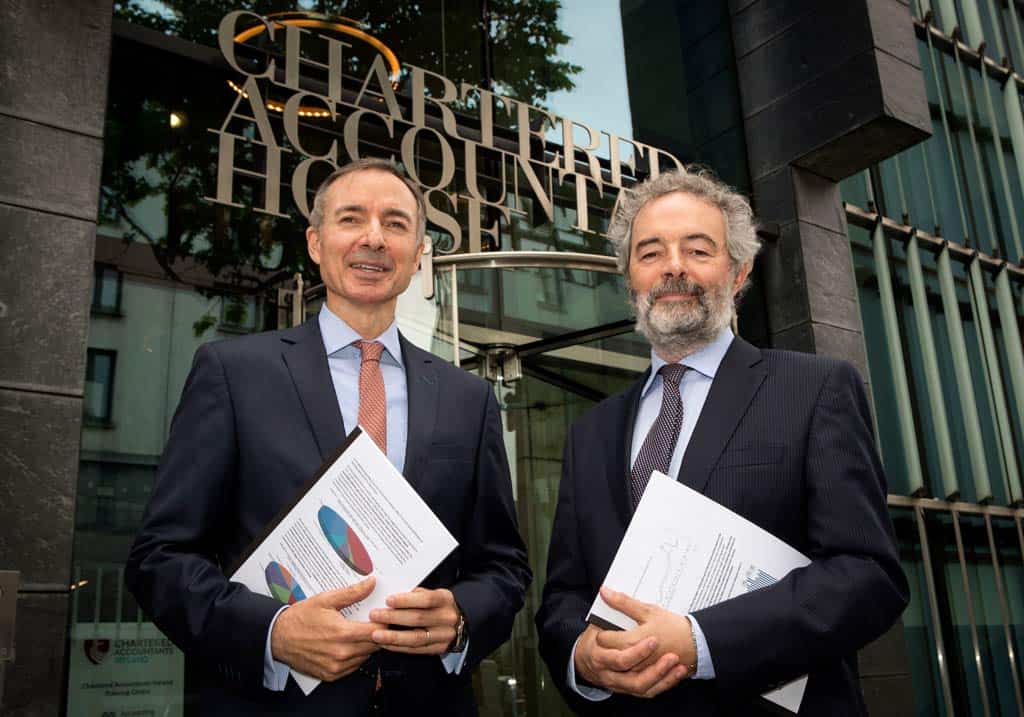Barry Dempsey, Chief Executive, Chartered Accountants Ireland with Austin Hughes, Chief Economist, KBC Bank Ireland, at the launch of the Q3 2018 Business Sentiment Results.
KBC Bank/Chartered Accountants Ireland Business Sentiment Results survey says Irish businesses more cautious as Brexit looms
The KBC Bank/Chartered Accountants Ireland business sentiment index slipped to 114.2 in summer 2018 from 116.4 in the last quarter. The latest reading is the weakest since that of spring 2017. Irish business sentiment has weakened marginally of late as increased uncertainty about the outlook for the global economy weighs on firms’ expectations for their own activity levels in coming quarters as well as their assessment of prospects for the Irish economy as a whole. The pull back in sentiment is largely due to increased caution about the future as the summer survey found companies have continued to report stronger output and hiring in the past three months.
The survey asked a number of questions on Brexit:
- Only 7% of companies felt that the impact of Brexit on their companies had become clearer of late while a Significant 17% felt it had become less clear.
- Irish based businesses think there is a one in three chance that the UK could leave the EU as early as March 2019 without the ‘safety net’ of a transition period. This implies that the possibility of a ‘crash exit’ by the UK is regarded as a material risk by Irish business even if it is not these companies’ central scenario.
- Irish firms would expect very broadly based negative effects on their activity levels in the event of a ‘crash exit‘ from the EU by the UK. Some 48% of companies envisage a worsening of the business outlook while just 4% would anticipate an improvement in their prospects
- Irish based businesses were asked to indicate the principal channel through which the UK’s exit from the EU would affect their companies’ activity levels. Two concerns dominate: market access and an increased documentation/regulatory burden.
On what should be the priority for Budget 2019, Irish business is split with equal numbers emphasising spending on social infrastructure (health and housing) and avoiding overheating in the Irish economy. The need to address serious ‘structural’ shortcomings in areas such as health and housing while reducing ‘cyclical’ concerns around a return to a ‘boom and bust’ path for the Irish economy could make for a challenging fiscal package.
Commenting on the survey results, Mr Barry Dempsey, Chief Executive at Chartered Accountants Ireland noted, ‘It is not surprising that increased uncertainty of late has made Irish business more cautious. However, the survey finds that Irish based companies are reporting that their levels of output and employment remain on a very solid growth path.’
Mr Austin Hughes, Chief economist at KBC Bank Ireland who prepared the survey noted, ’While the number of companies reporting job gains in the past three months is four times the number of companies reporting job losses, it is clear that confidence is being affected by a range of threats running from Brexit and trade tensions internationally to domestic concerns such as housing and overheating risks.’
Mr Hughes added, ‘although there has been a great deal more heat about Brexit recently, there doesn’t appear to be a great deal more light as only 7% of companies say the consequences for their business operations have become clearer of late while 17% say they have gotten less clear. This may be due to the possibility of a ‘crash exit’ from the EU by the UK which is seen as a one in three possibility by companies, suggesting it is seen as a real risk even if it isn’t their central scenario.’
Mr Dempsey noted, ‘Companies see a range of threats to their activities from Brexit at present but two concerns appear to dominate. These are potential constraints to their access to the UK market and the prospect of notable increases in customs documentation and regulatory requirements. So companies appear worried about both ‘red ink’ and ‘red tape’ impacts on their operations from Brexit.’







